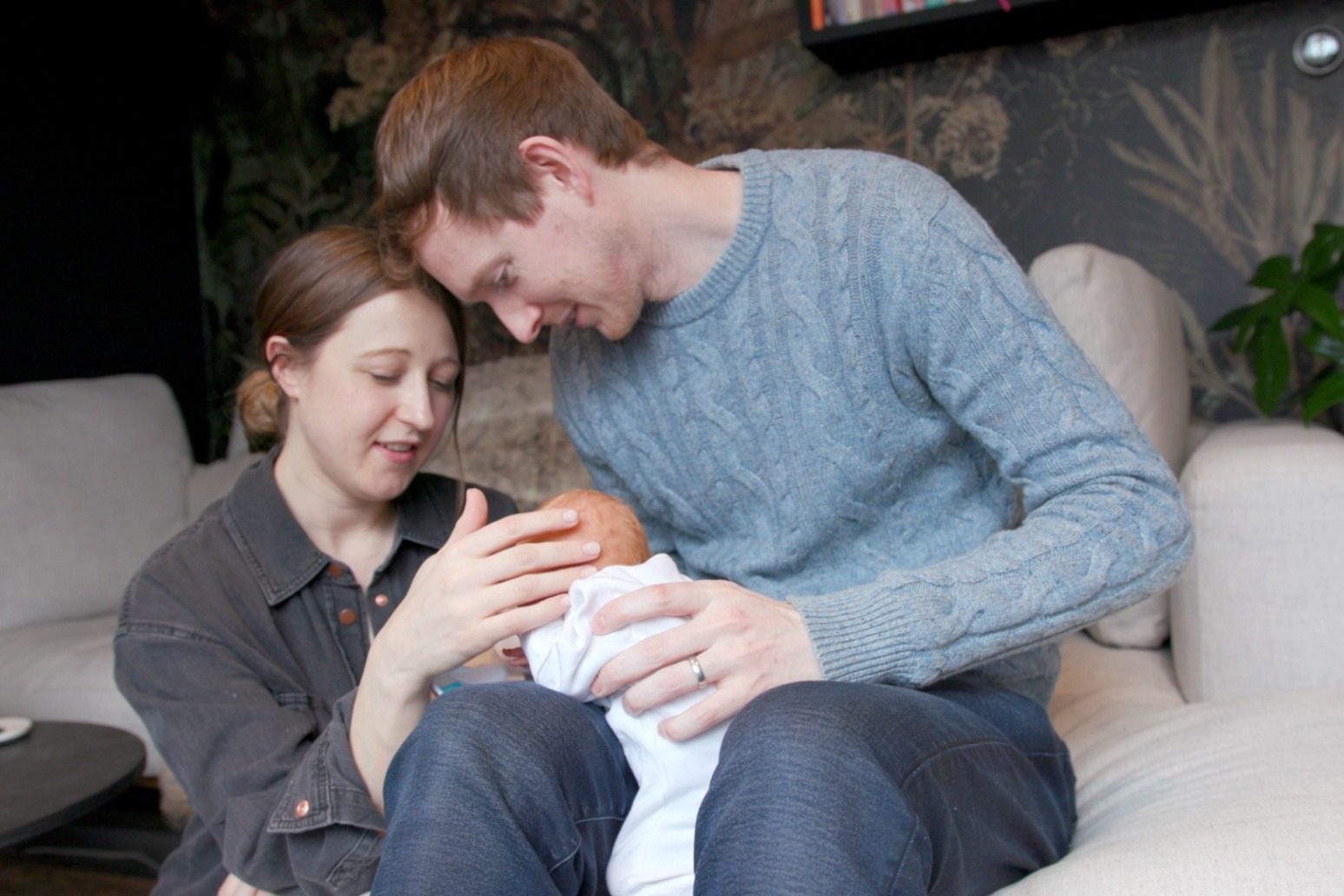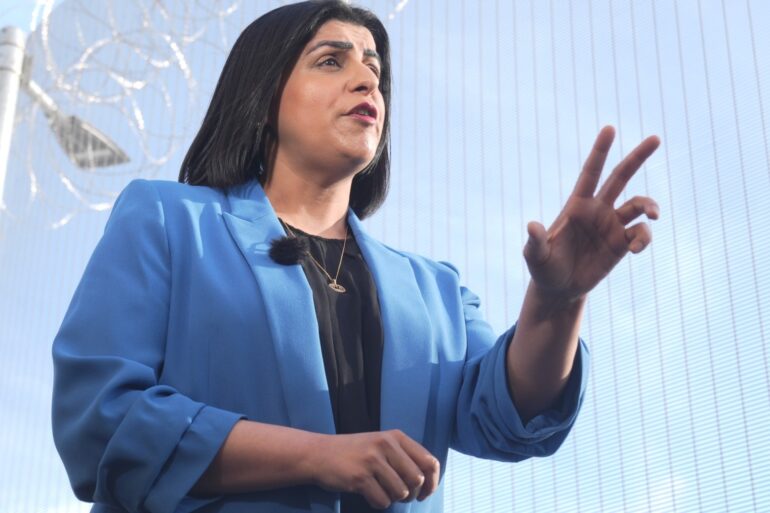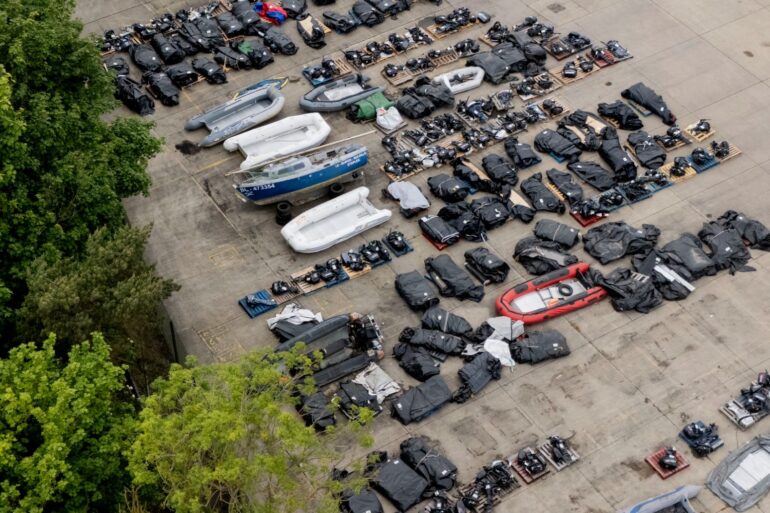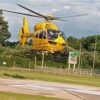-
 play_arrow
play_arrow
Kl 1 Radio Local radio for west Norfolk
-
 play_arrow
play_arrow
KL DISCO KL Disco Playing Disco Music from the 70's onwards.24/7
-
 play_arrow
play_arrow
KL COUNTRY KL COUNTRY Playing New and Classic Country Music 24/7
-
 play_arrow
play_arrow
KL ROX KL ROX The best of New and Classic Rock.24/7
-
 play_arrow
play_arrow
KL SUMMER Summer Vibes 24/7 from KL1 Radio across West Norfolk
-
 play_arrow
play_arrow
KL CLASSICAL Your Symphony Starts Here
-
 play_arrow
play_arrow
KL CHILL Just Chill!
-
 play_arrow
play_arrow
KL POP The Best POP Hits all day Long!
-
 play_arrow
play_arrow
KL XTRA KL XTRA
music_note

A baby girl has made history as the first child in the UK to be born from a womb transplant.
Grace Davidson, 36, from north London, received the organ – also called the uterus – from her older sister, Amy, in the UK’s first womb transplant in 2023.
Now, following the huge success of the procedure, she has given birth to baby Amy Isabel, named after her aunt and a surgeon who helped perfect the technique.
The news gives hope to thousands of women born without a womb or whose womb fails to function.
Mrs Davidson, an NHS dietitian, and her husband Angus, 37, who works in finance, are over the moon with their new arrival.
Baby Amy was born by planned NHS Caesarean section on February 27 at Queen Charlotte’s and Chelsea Hospital in London.
Mrs Davidson said she felt “shock” when she first held her daughter, adding: “We have been given the greatest gift we could ever have asked for.”
She told the PA news agency: “It was just hard to believe she was real. I knew she was ours, but it’s just hard to believe…
“Our family are just so happy for us. It sort of feels like there’s a completeness now where there maybe wasn’t before.”
Mrs Davidson was born with Mayer-Rokitansky-Kuster-Hauser (MRKH), a rare condition that affects around one in every 5,000 women, meaning they have an underdeveloped or missing womb.
However, the ovaries are intact and still function to produce eggs and female hormones, making conceiving via fertility treatment a possibility.
Before receiving the donated womb, Mrs Davidson and her husband underwent fertility treatment to create seven embryos, which were frozen for IVF in central London.
Mrs Davidson then had surgery in February 2023 to receive the womb from her sister Amy Purdie, 42, a former primary school teacher, who is mother to two girls aged 10 and six.
Several months later, one of the stored embryos was transferred via IVF to Mrs Davidson.
Amy, who weighed 4.5lb, was delivered several weeks early in the planned 90-minute Caesarean section, to ensure a safe, hospital-based delivery.
Mrs Davidson and her baby stayed in hospital for about a week to establish breastfeeding.
The new mother said: “The first couple of weeks were tricky because she was so sleepy, and we were struggling to kind of keep her awake enough for her feed, but she’s doing really well.
“She had a bit of jaundice to start with, and she needed a bit of light therapy, but she’s a stronger feeder now, and she’s more alert.
“She will kind of wake herself up when she wants a feed, which is nice.”
She added: “It’s lovely to be at this stage where we can get snuggles and it’s really special.”
Mr Davidson said the moment his daughter arrived was very emotional.
“She came out crying, and we were a bit worried she would be whisked off to an antenatal ward, but she’s been with us every minute of her life so we’re so grateful for that,” he said.
“It had been such a long wait. We’d been intending to have a family somehow since we were married, and we’ve kind of been on this journey for such a long time.
“Having waited such a long time, it’s kind of odd getting your head around that this is the moment where you are going to meet your daughter.
“The room was full of people who have helped us on the journey to actually having Amy.
“We had been kind of suppressing emotion, probably for 10 years, and you don’t know how that’s going to come out – ugly crying it turns out!
“The room was just so full of love and joy and all these people that had a vested interest in Amy for incredible medical and science reasons.
“But the lines between that and the love for our family and for Amy are very much blurred – it felt like a room full of love.
“The moment we saw her was incredible, and both of us just broke down in emotional tears – it’s hard to describe, it was elation.”
Mrs Davidson said the couple always had “a quiet hope” the womb transplant would be a success.
“It was quite a long run up to the transplant, maybe eight years or so, and we kept thinking it might get ruled out for various reasons,” she said.
“But once we had the transplant, I think we were hopeful that things were going to work out.
“But it wasn’t really until she arrived that the reality of it sunk in.”
She added: “Lots of womb transplants fail in the first two weeks so even just to get to that point was amazing, and having my first period was really amazing, because it showed it was working.
“What helped us through the tough times was sort of thinking this is all going to be worth it…
“I’m so grateful, it’s given us so much.”
She said the couple “definitely” wanted to have another child.
Mrs Purdie, who lives in Scotland, was not at the birth but was only a phone call away.
She said: “Watching Grace and Angus become parents has been an absolute joy and worth every moment.”
She added: “It’s been amazing, as it would be for any auntie, but this is particularly special.”
Mrs Purdie said she did not hesitate to think about donating her womb to her younger sister once the living donor transplant programme became a possibility.
“It was very natural,” Mrs Purdie told PA.
“Because we had followed Grace on the plan of a deceased donor, we had gone on the journey with her.
“And then when she mentioned that there was this opportunity, immediately both me and my older sister, Laura, and our mum – we all said we would do it. There was no question about it.”
Mrs Davidson was diagnosed as having no womb when she was 19 and found out about womb transplants at the same time.
“It was very much at the research stages, but the consultant said this might be available in my lifetime,” she said.
“The year before we got married, I just sort of Googled it and found out there was a research team, and there was an email address, so I emailed them.
“We basically got recruited from 800 women down to 10, I think, and that was purely for the deceased donor trial.
“We were on that for maybe three years, and then the living donors really took off as a possibility.
“The team suggested to me that we might want to consider that. I think they thought we’d probably have a family sooner if we went down that road.”
Asked how having a diagnosis of MRKH has affected her life, Mrs Davidson said: “I think it’s hard to know at the time of diagnosis, it’s hard to know how it’s going to affect you.
“I probably already knew that I wanted to be a mum. There was never any question, and so it was just devastating, to be honest…
“I sort of just felt a huge sadness over me.”
She said some situations would be upsetting, adding: “I used to just get triggered by seeing a mum with a pushchair, it’s really ordinary stuff and it would kind of catch you by surprise.”
Mrs Davidson said she hopes women in a similar situation will now have more options going forward.
“Like here’s this wonderful baby, and there’s that real desire in me, like an innate desire, to be a mum, to carry my baby and to know them from the earliest moment.
“So, I think just knowing that that is an option… this is huge, when it wasn’t there before.”
During her pregnancy, Mrs Davidson took immunosuppressants to ensure her body did not reject the womb.
She said it was an easy pregnancy, adding: “I was pretty lucky, I didn’t really have much nausea at all.
“I had a bit of bleeding early on, which was a concern, but actually it sort of self-resolved at about 14 weeks. And I was getting regular scans every two weeks.
“I felt like I had energy right up to the point I delivered.
“I was still very active and I loved the third trimester because you’ve got a bump, you can feel them kicking all the time. It was lovely.”
The lead surgeons for the womb transplant were Professor Richard Smith, clinical lead at the charity Womb Transplant UK and consultant gynaecological surgeon at Imperial College Healthcare NHS Trust, and Isabel Quiroga, consultant surgeon at the Oxford Transplant Centre, part of Oxford University Hospitals.
Both surgeons were in the operating theatre when Amy was delivered, and her parents chose her middle name in honour of Miss Quiroga.
Prof Smith, who led the development of womb transplants in the UK, shed tears at the birth.
He said: “I feel great joy actually, unbelievable – 25 years down the line from starting this research, we finally have a baby, little Amy Isabel. Astonishing, really astonishing.”
Miss Quiroga said: “For me, it’s total joy, delight. I couldn’t be happier for Angus and Grace, what a wonderful couple.
“It was overwhelming actually, it remains overwhelming. It’s fantastic.”
Womb Transplant UK has carried out four womb transplants in the UK – the first on Mrs Davidson and then three on women who received wombs from deceased donors.
It has enough cash for two further operations and is fundraising to carry out more.
Kate Brintworth, England’s chief midwifery officer, praised the NHS’ role in the delivery, adding: “I am so delighted that Grace, Angus and their whole family have been able to welcome the miracle of Amy to the world.”
Published: by Radio NewsHub

Similar posts
Upcoming shows

Paul Baker – KL1 Breakfast
7:00 am - 10:00 am

Chris Fisher – KL1 Mornings
10:00 am - 1:00 pm

Chris Osler – Friday Afternoon Show
1:00 pm - 4:00 pm

Richard Dix – KL1 Drive
4:00 pm - 7:00 pm

emoviebox
7:00 pm - 8:00 pm
Message Us
Copyright The Mediasite UK - 2025








